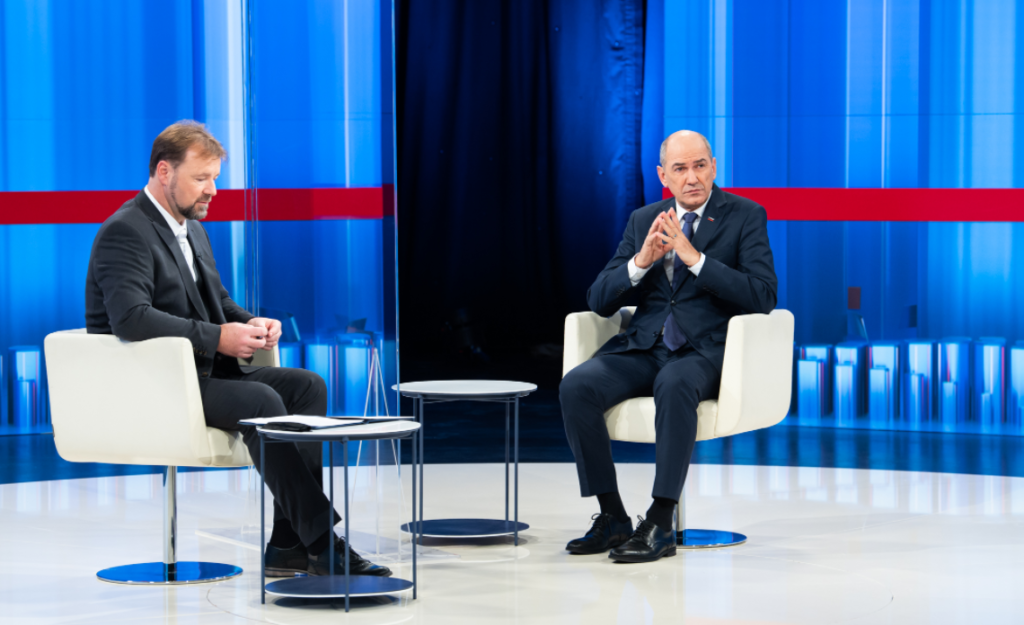“If the pressure is suddenly too much, then the system starts to fall apart and of course people die because of other things, not just because of covid. This must be avoided in every way and therefore measures are needed that no one likes, least of all the government, which then bears all the responsibility and all the anger for it because it had to accept them,” said Prime Minister Janez Janša in a conversation with Jože Možina on state television. He replied that regarding further measures we could not do anything that other European countries would not do, meanwhile criticism was directed at the Constitutional Court and at the media.
“I do not claim that all the decisions of the Constitutional Court were unfounded, but if we compare what other countries have done with similar political systems and arrangements, divisions between branches of government, then we see that our hands are strongly tied,” said Janez Janša. He added that, in his opinion, the profession does not dare to propose measures, as it fears that they would be repealed, and among other things, he commented on resolving with laws and not decrees: “Tell me one country that had to pass 10 laws to be able to take action at all?”
About the adopted PKP 10
On Monday, the PKP 10 law was passed, which is very generous to a wide range of aid recipients, which is why many accuse the Prime Minister that the law is just “pre-election candy”. The Prime Minister explained that the last of all the packages cost the state treasury the least, but that it was intended primarily to mitigate the rise in electricity prices for the category that immediately feels the consequences or the most vulnerable people. Regarding the concern expressed by Alenka Bratušek regarding government’s borrowing, the Prime Minister said that the money was intended for the people and especially for the Slovenian economy, which also enabled it to grow, but we are all aware that the money comes from the economy. “During this time, Slovenia borrowed 20 percent less than other European countries, according to objective external indicators that the government cannot invent. All indications are that we acted right, but unfortunately, we had to collect the votes of the majority in the National Assembly for each package. The opposition has always invented reasons against it,” Janša explained.
We paid a high price, as not a single retirement home has been built in 13 years
The fact that the number of deaths due to covid was high last year, Prime Minister explained that this happened in the autumn mainly in nursing homes, because it was not possible to separate the infected from the healthy overnight, as “in 13 years, Slovenia has not built a single home for the elderly from the budget, nor has any existing home been modernised, so we paid such a price”. In his opinion, the non-cooperation between the position and the opposition for the separation of people regarding the observance of measures is not so much to blame as the responsible media is, which in his opinion brought the separation into the public sphere. He is aware of the problems caused by anti-vaccination movements due to such and other information from the media and social networks; in the end, this mostly incurs a cost to the state if the unvaccinated become ill and are then treated. Vaccinated people are significantly less endangered, and as a result, the pressure on health care in case they get sick is reduced.
Slovenian Presidency of the Council of the EU
As one of the current topics was the Slovenian Presidency of the Council of the EU, Možina also touched on this. The Prime Minister said that many key issues had been resolved and that Slovenia had attended almost all the events physically and not virtually, as had become the practice in this time. In his opinion, this was often decisive, because “you personally reach compromises that you cannot reach through the screens”. “Although everything took place in physical form, our approach to costs was very rational, we spent significantly less than we planned, and we also built the Brdo Centre, which saved us a lot of costs, as we were able to organise everything there,” he added. He highlighted the success of Interior Minister Aleš Hojs as two great successes, as he managed to coordinate a unified approach of the entire Union after the debacle in Afghanistan; “thanks to this, we do not have a wave from Afghanistan today because we said there will be no humanitarian corridors, we will help those who helped us during the NATO mission.” As another success, the Prime Minister considers the fact that the EU has returned its enlargement to the table.
Willingness to cooperate
Regarding the events on the side of the opposition and their electoral strategy, Janša said that he did not deal with it much, as he lacked time for it. However, he pointed out the essential and fundamental philosophy of the SDS party, which is the willingness to cooperate with any party that would show interest in this, because only in this case can politics in Slovenia reach a higher level.
Tanja Brkić


